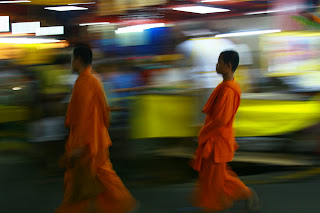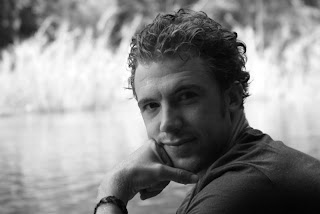 We jumped off the pickup truck an hour outside of Mae Sot, after the police checkpoint and in front of the gates of Mae La Refugee Camp.
We jumped off the pickup truck an hour outside of Mae Sot, after the police checkpoint and in front of the gates of Mae La Refugee Camp.With a mouth full of betel nut, Pathi, my guide and passport into the camp, looked both ways before crossing the street. An ex-spy for the Karen rebel army, Pathi knew how to be quiet. He motioned me to follow, quickening his pace to duck into the gate, turn some corners, and enter the jungle. We stopped. He slapped me on the back and said, “There. Now we’re safe.”
With over 40,000 refugees, Mae La is the biggest camp in Thailand for refugees from Burma. Accessing it legally as a foreigner costs time, money and a lot of bureaucratic wrangling. Pathi told me he could take me through the back door.
Mae La is a sprawling camp, with over 8,000 bamboo and leaf-thatch houses scattered over a hillside. Its road front stretches three kilometers. While some refugees are being resettled in third countries, even more are coming from Burma each year. There are 154,000 spread across nine camps along the border. For two years now, Thailand has declared a ban on new refugees. They still come. Only now they don’t have the benefit of registration cards and the NGO food rations that come with them.
Saw Lu Hu, his wife Naw Ko Weh and their two young twins are one such invisible family. Five months ago they fled Burma’s eastern Karen state, where a war between an ethnic army and the Burmese military has raged for 50 years, because their village was about to be destroyed. Now in the refugee camp, they sit in the bamboo hut Lu Hu built. They have no refugee cards. They have no food rations. Their bone-thin twins are squirming in their laps.

“We had no place to live,” Lu Hu says. “We had to pay many taxes to the [military]. The troops called us to be porters, and if we couldn’t go, we had to pay. I was a porter three times.”
Lu Hu fled through the jungle with seven other families, finally crossing the border to seek refuge in Thailand. But the problems didn’t end there. Now his family has a roof over their heads, but food is scarce. For that, Lu Hu and his wife Ko Weh sneak out of the camp to work in the fields of a neighboring farm. The Thai farmer pays them 60 baht ($1.70) for a 10-hour shift. It pays for rice, fish paste and yellow beans, but little else.
“No, it’s not enough. But it’s better here than there,” Lu Hu says, nodding towards Burma.
I gave one of his sons half a pack of biscuits. He took them quickly, blankly. I smiled and reached down to squeeze his arm. It was more bone than flesh. He turned into his mother and curled the biscuits into his chest.
Some of the refugees are given UNHCR refugee status and resettled in third countries. Saw Pu Keh, 44, is preparing to take his family of four to Australia. He doesn’t know what to expect, but is happy that his daughters will get an education.
“I’m afraid of the plane,” he told me. “And I’m afraid of arriving in Australia without knowing any English.”
I asked him what work he would like to do. His answer was quick.
“I would like to prepare a field to plant rice and vegetables. Can you do that there?”
Pu Keh and his family have lived in the camp for eight years. It hasn’t been much of a life.

“It has been very difficult here. We can’t go outside. But we can’t work in the camp either, there are no jobs,” he said. “I think it will be better in Australia.”
Pu Keh has supplemented the NGO-donated rations of rice, fish paste and yellow beans by buying fish at a shop on one end of the camp, and walking it to the other end to sell for a small profit. He too makes about 60 baht a day. He is sad to have had to leave his home in Burma, but is happy his daughters will have a future.
“I want my daughters to be educated, he said. Our hopes are for our children.”
Down the dirt path is a shop selling outdated tins of food, betel nut and braziers for 30 baht a bag. Beyond it, Manday Tu, 50, steps out of her hut with a basket to collect edible leaves from the jungle to put in a soup for her family.
Her smile shines in the squalor, and belies the struggle of her 22 years as a refugee.
Manday Tu left her village when she was 28. The military had come, demanding rice and money. Unhappy with their spoils, they took a group of 15 villagers captive. Manday watched 3 have their ears cut off with a knife. They were tortured further, and later she saw them hanging from a tree. She took her family and ran.
She lived for 12 years in jungle camps with other displaced villagers, under the protection of the rebel army. When the camps were attacked, she would flee again. Eventually she arrived at the Salween River separating Burma and Thailand. With nowhere else to go, she crossed the border. She has lived with her family in three refugee camps before coming to Mae La.

“I am sad to think of my home,” Manday Tu says. Her hair is tied neatly in buns and there is grace in her eyes. “In our village we had to go to the fields and take care of the animals, we were very busy. Here we can’t go anywhere. Here we have no work.”
Manday Tu is looking after her ailing parents. When they pass away she says she wants to apply for resettlement in the United States. She, too, wants a future for her children. And, despite the pain, she’s come to terms with her exile.
“When I think about the military and what they did to our village, I get sad,” she says. “But we have no power. Everything the military does they do with a gun and no one can do anything.”
And then the shadow in her face passes. She looks at me and smiles generously. Even after everything has been taken from her, Manday Tu can’t stop giving.
“If I get to America, you must visit me,” she says. “You must come to stay with me.”



 Pon is from Laos. She came to Bangkok two years ago because she could earn more money here. She likes to joke. She exaggerates figures when she speaks, then hastily backtracks when called out. Hers is not the most remarkable of lives. But it’s a life. One of Bangkok’s 10 million. And, as far as lives go, it’s a consistent one. You can find her on the same street corner in Bangkok’s grimy automotive repair district every morning of the week except Sunday, when she rests. She’s there at six and she’s gone by two.
Pon is from Laos. She came to Bangkok two years ago because she could earn more money here. She likes to joke. She exaggerates figures when she speaks, then hastily backtracks when called out. Hers is not the most remarkable of lives. But it’s a life. One of Bangkok’s 10 million. And, as far as lives go, it’s a consistent one. You can find her on the same street corner in Bangkok’s grimy automotive repair district every morning of the week except Sunday, when she rests. She’s there at six and she’s gone by two. She’s in her twenties, has two children and a boyfriend. She comes from the countryside of southern Laos, where she planted rice with her family. She came to Bangkok looking for opportunity. She misses her family and country, but is able to go back to visit five times every year.
She’s in her twenties, has two children and a boyfriend. She comes from the countryside of southern Laos, where she planted rice with her family. She came to Bangkok looking for opportunity. She misses her family and country, but is able to go back to visit five times every year. Some days she only makes 300 baht, about US$10. Those numbers went up and down as we talked. Whatever the case, it’s not a lot, and she sends much of it back to her mother in Laos, who is looking after her son.
Some days she only makes 300 baht, about US$10. Those numbers went up and down as we talked. Whatever the case, it’s not a lot, and she sends much of it back to her mother in Laos, who is looking after her son.



